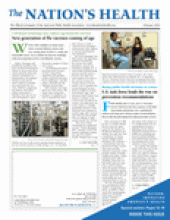Comprehensive smoke-free laws protected only a small percentage of the world’s population in 2008. That and other recent findings point to a continued struggle in the global fight against the health effects of tobacco.
The World Health Organization reported in December that smoke-free laws covered only about 5 percent of the world’s population in 2008, up from about 3 percent in 2007. WHO officials and anti-tobacco advocates called the report a wake-up call to governments and urged countries to do more to implement secondhand smoke protections and other provisions of the Framework Convention on Tobacco Control. The 2005 framework has been ratified by nearly 170 countries, but not the United States, and lays out responsibilities such as protecting people from tobacco smoke and offering help for smokers to quit.
“The fact that more than 94 percent of people remain unprotected by comprehensive smoke-free laws shows that much more work needs to be done,” said Ala Alwan, MD, WHO director-general for noncommunicable diseases and mental health. “Urgent action is needed to protect people from the death and illness caused by exposure to tobacco smoke.”
Seven countries adopted comprehensive smoke-free laws in 2008 — Colombia, Djibouti, Guatemala, Mauritius, Panama, Turkey and Zambia — bringing the total number of countries with such laws to 17. The report highlights new data showing 600,000 people die yearly as a result of exposure to secondhand smoke. And countries are not implementing other tobacco treaty obligations such as raising tobacco taxes, requiring graphic warnings on tobacco packaging, and banning all tobacco advertising, promotion and sponsorship.
“There is no time to waste, because the tobacco industry is aggressively targeting the developing world with its deadly and addictive products,” said APHA member Matthew L. Myers, president of the Campaign for Tobacco-Free Kids.
Tobacco use already kills 5.4 million people each year, and the report points to a worsening epidemic in the developing world. As tobacco use declines in developed countries, more than 80 percent of tobacco-caused deaths are expected to occur in the developing world in the coming decades.
“People need to be told that tobacco is bad for human health,” said Douglas Bettcher, PhD, MD, MPH, director of the WHO Tobacco Free Initiative. “Comprehensive tobacco control will help countries to reduce the rising number of heart attacks, strokes, cancers and other noncommunicable diseases.”
The report describes countries’ efforts to implement a WHO tobacco control package introduced in 2008 that was designed to help countries put in place some of the tobacco framework recommendations. Less than 10 percent of the world’s population is covered by any of the six measures, including warnings about the dangers of tobacco, enforcing advertising bans, monitoring tobacco use and offering secondhand smoke protections.
In related global tobacco news, the Centers for Disease Control and Prevention in December released tobacco survey data from Bangladesh, one of 13 countries taking part in the first round of the Global Adult Tobacco Survey. According to the survey results, almost half of all the country’s men smoke tobacco and 63 percent of workers, or 11.5 million adults, are exposed to tobacco smoke on the job. Organizers hope the surveys will help the respective nations create and improve anti-tobacco policies and programs.
The full “WHO Report on the Global Tobacco Epidemic, 2009” is available at www.who.int/tobacco/mpower/en. For more CDC global tobacco data, visit www.cdc.gov/tobacco/global/gats.
- Copyright The Nation’s Health, American Public Health Association









